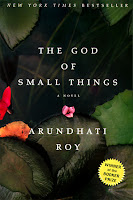 This book is packaged in the form of a series of letters written from an Indian entrepreneur to a Chinese Premiere during the latter’s visit to India, the intention being to “enlighten” him about the real India. The book is about the journey of this man’s (white tiger) life in India – one part of it in “darkness” and the other basking in “light”. The darkness which prevails in the villages and the light which makes the modern cities glow…
This book is packaged in the form of a series of letters written from an Indian entrepreneur to a Chinese Premiere during the latter’s visit to India, the intention being to “enlighten” him about the real India. The book is about the journey of this man’s (white tiger) life in India – one part of it in “darkness” and the other basking in “light”. The darkness which prevails in the villages and the light which makes the modern cities glow…The protagonist who started his life in the darkness and moved into the light, provides an account of the path he took to carve out of himself a successful entrepreneur. The character himself is clear on the morality issues, but has no repentance of what he did in his journey towards entrepreneurship. Very fluently, he continues providing his confessions of the crimes he keeps on committing, but at the same time, he has no repentance of what he did in his journey towards entrepreneurial success. He sites numerous evidence of the injustice and corruption prevailing in India driven by an extremely servitude attitude of those who are at the receiving end.

